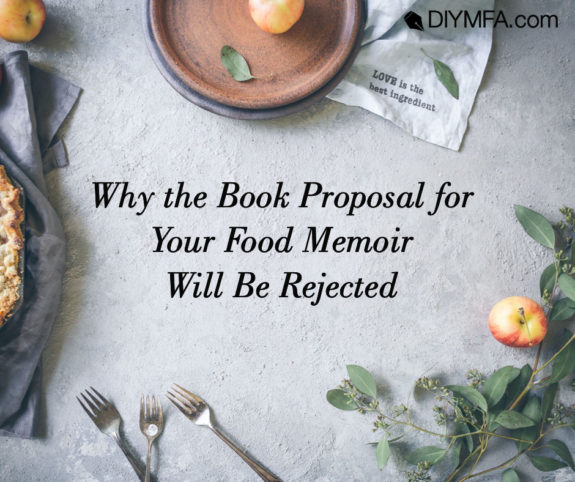To write anything is to know that it can be rejected. It’s the unspoken oath you take as a food writer. There will be people who aren’t sold on what you can deliver, so you’ll have to refresh your work or find someone else who gets it. The hard part is you don’t always get feedback, so you don’t know where to begin. That’s especially true of submitting a book proposal for your food memoir.
A book proposal is the business plan for your book and a way to sell your memoir before you have to write the whole thing. Some agents and publishers will want the full manuscript too, but a book proposal is worth doing either way.
There are many reasons a proposal is rejected, like personal taste or being a good fit at the right time. However, it’s better to be rejected for things you can’t control than to be rejected for something you can control, like formatting. So, here are the three reasons the book proposal for your food memoir will be rejected.
1. Your Author Platform is Too Small
When you imagine writing your dream food memoir, you probably don’t think about your platform very much. Sure, you may imagine how people will share it on social media and how you might engage with them, but a platform is larger than that.
One of the biggest reasons a book proposal is rejected is because the author’s platform isn’t big enough. Agents and publishers want to know that you have authority on a topic or angle and can reach thousands of people who will want to buy your book.
A platform can mean a lot of things, but the important thing is your platform is made up of places you like to hang out. Your storytelling skills are a gift for building your platform.
Are you hooked on Twitter and not wild about Instagram? That’s okay. Maybe you’ve found success as a regular guest contributor for a popular website. Or perhaps the inspiration for your book started with social media like Emily Nunn’s The Comfort Food Diaries. Perfect. You want to show that you’ve created an engaged audience, and you’re able to increase that reach.
One element of your platform should absolutely include an email list. You’ll want a direct line to your people, so no algorithm or missed post hides your work from them. It’ll also be a way to build a deeper community, which you’ll rely on when your book is released and long after.
2. Weak Competitive Title Analysis
This may be hard to hear, but just because your story is yours, doesn’t mean it’s never been told before. Writers love to believe that their story is not like anyone else’s. While that may seem romantic and revolutionary, it’s bad for selling your book. Your book proposal is a business plan, so it’ll be rejected if agents and publishers don’t know where it stands in the market.
If you believe your book is one of a kind, it also means you’re not reading enough. Even Anthony Bourdain admitted that Kitchen Confidential was heavily influenced by George Orwell’s Down and Out in Paris and London, which was an insider’s guide to Parisian restaurant life in the 1920s.
You also need to choose books that did well commercially. If you list an obscure title that has six reviews on Amazon, agents and publishers will throw your proposal in the trash immediately. Give your food memoir its best chance by digging into comp titles, figuring out how it stands out amongst its competitors and making the case for how readers want the book you have.
3. Not Knowing the Complete Story
A client of mine was told by some published authors that my client could write their proposal after 40% of their memoir was figured out. In theory, this makes sense. One of the main reasons to write a proposal is so you don’t have to write the entire book first. However, you still have to know the complete story to write a book proposal.
With every proposal, there’s a section for the chapter summaries. This includes a chapter title, paragraph or two about what the chapter is and a line about what recipe you would include if you have one. For the writer who creates by the seat of your pants, this may be your actual nightmare. It doesn’t have to be though.
You may write your entire book before you hone in on your story. Every writer has their own process, but sometimes, writers sit in the pantsing or plotting process to avoid the actual work. It’s scary committing to a story you believe in, but you also can’t hide from what you’re meant to create.
The outline of your book will show agents and publishers the heart of what your story is about. If you can show your story telling abilities in the paragraph or two for each chapter, you’re proving you have a well-crafted food memoir on your hands. It’ll also make the book writing process that much easier once you sit down in front of the computer.
Troubleshooting the Rest of Your Book Proposal
Now that you know three reasons the book proposal for your food memoir will be rejected, how do you know that you’re not making other mistakes? From Jane Friedman’s self-study course to How to Write a Book Proposal by Jody Rein and Michael Larsen, you can find a number of easy to access resources to walk you through the process. If that doesn’t quite cut it, you can always hire someone to coach you.
Like any writing project, it will take longer than you expect, and you will make mistakes along the way. It’s expected! The important thing is to stay curious about what makes a book proposal great and know that even if your proposal is rejected, it’s all part of the process.

Amanda Polick is a writer and book coach, who guides food folks through the writing process. Her work has been featured by Cooking Light, Food & Wine and Time. She lives in Nashville, Tennessee now, but a piece of her will be in California forever. To connect with Amanda, you can find her on her website.







